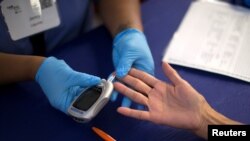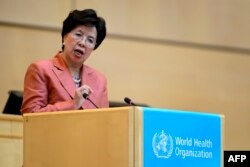The World Health Organization's director-general, Margaret Chan, is calling for greater equity in the delivery of health care for rich and poor alike. The WHO chief is urging delegates attending the agency’s annual executive board meeting to do more to close the health gap between the haves and have-nots.
This is Margaret Chan’s last term as director-general. The new head of the World Health Organization will be confirmed at the World Health Assembly in May. So, perhaps, unsurprisingly, Chan stressed the many achievements, which have been made in health under her watch, while not shying away from pointing out the shortcomings.
She says health inequalities often are aggravated by the high price of medical products, but notes that WHO initiatives have successfully pushed down the prices of vaccines and other medical items.
Life-saving vaccines
She says huge price reductions in a vaccine for chronic hepatitis C infection are now making it possible for more than 1 million people living with this illness in developing countries to receive life-saving treatment.
Chan says positive actions by WHO succeeded in ending a yellow fever epidemic in Angola and Democratic Republic of Congo in September. She also says measles immunizations over the past 15 years have saved the lives of 20 million children and progress continues to be made in controlling HIV, tuberculosis and malaria.
“The achievement that brought the most joyful headlines came at the end of last year, when WHO published final trial results demonstrating that the new Ebola vaccine confers nearly 100 percent protection… We have by no means defeated this re-emerging disease, but when the next outbreak inevitably occurs, responders will not be empty-handed,” Chan said.
Chan, however, warns nations must remain vigilant of the many existing health threats and emerging diseases. She urges all countries to keep a close watch over outbreaks of avian influenza in birds and related human cases.
She says the world is better prepared to tackle the next bird flu pandemic, but not well enough, adding that nations must remain on high alert for fresh outbreaks of this deadly disease.
Chan says the global tobacco epidemic is killing 6 million people prematurely every year but that cheap, effective measures, such as raising taxes on cigarettes, can control and prevent this epidemic from spreading.





